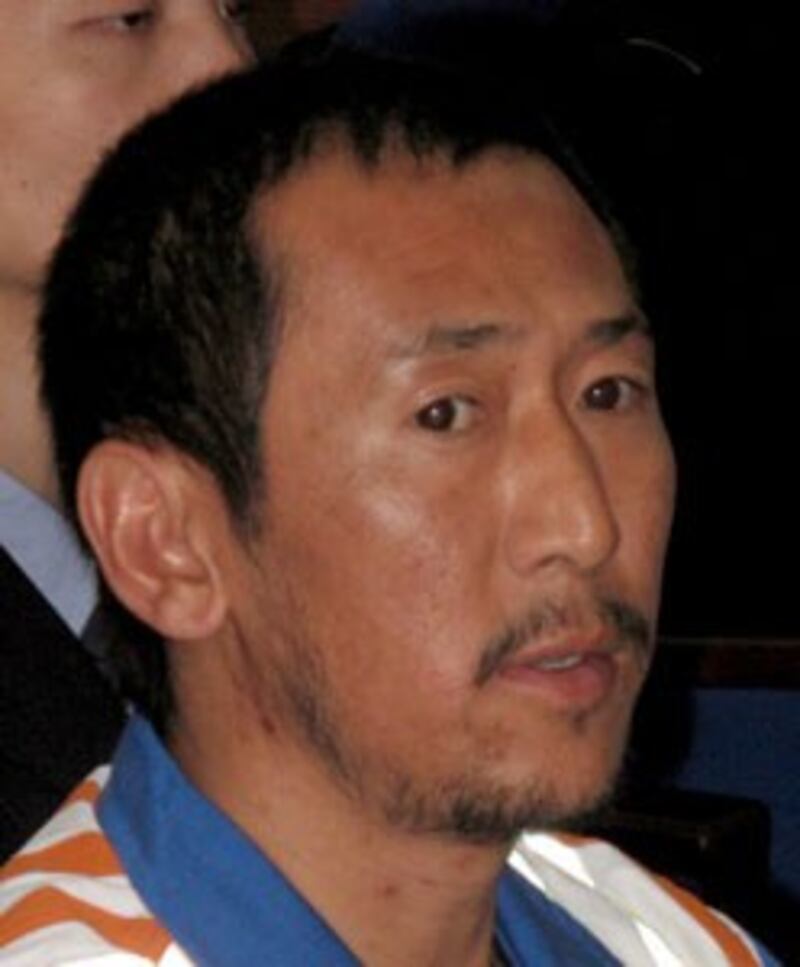A court in China’s western Sichuan province has sentenced a Tibetan man to death in connection with the self-immolation of his wife, accusing him of killing her and burning her body to cover up his crime, in a conviction condemned by a rights group as a part of Beijing’s "smear campaign" against dissidents.
Drolma Kyab, 32, was sentenced on Aug. 15 by the Ngaba Intermediate People’s Court about five months after his wife, Konchog Wangmo, 29, set herself ablaze in Dzoege (in Chinese, Ruo’ergai) county in Sichuan’s Ngaba (Aba) Tibetan Autonomous Prefecture to protest Chinese rule in Tibetan-populated areas, according to local sources.
The sources, citing contacts in the region, had told RFA’s Tibetan Services then that Kyab was detained the day after Konchog Wangmo self-immolated on March 13 when he refused to comply with an order by Chinese authorities who wanted to blame the burning on a domestic argument.
Tibetan exile sources, reacting to the death sentence, expressed doubt as to Drolma Kyab’s guilt, describing the action as a “hardening” of Beijing’s approach to containing the Tibetan self-immolation protests.
The Dharamsala, India-based Tibetan Centre for Human Rights and Democracy (TCHRD) suggested Chinese authorities may have used torture to extract confessions from Drolma Kyab.
“TCHRD remains reasonably skeptical over alleged confessions made by Mr. [Drolma] Kyab regarding his involvement in the so-called murder of his wife. Torture is still used extensively to extract confessions in politically-motivated cases,” the rights group said.
“China’s lack of transparency in handing [down the] death penalty, in addition to its frequent failure to comply with international legal standards, raises important questions over the lawfulness of the ... death sentence passed on [Drolma] Kyab,” it said.

'Reprehensible'
The Center called on Chinese authorities to refrain from “politicizing the issue of self-immolation protests and end the reprehensible practice of smear campaign against legitimate expressions of grievances.”
China’s state Xinhua news agency reported that Kyab strangled his wife at 11:00 p.m. on March 11 following an argument over a “drinking problem.”
“He then burned his wife’s body early next morning to make it look like she had committed self-immolation,” Xinhua said, quoting court officials.
However, Tibetan sources in exile had reported at the time that Konchog Wangmo had burned herself to death on March 13 “on the main street of Dzoege County town,” TCHRD said.
The rights group noted that Chinese authorities have made “aggressive overtures” in recent years to the surviving relatives of self-immolation protesters, sometimes offering large sums of money in exchange for declarations by family members that the burning victims had killed themselves because of family troubles.
In January, the Ngaba Intermediate People’s Court had handed a death sentence with two years’ reprieve to Lobsang Konchog, 40, on charges of “intentional homicide” for his alleged role in supporting another self-immolation protest in Sichuan.
The death sentence now handed to Drolma Kyab “indicates that the authorities have hardened their stance on the issue of self-immolation, by making an example of a few defiant relatives …” TCHRD said.
The Center said it is seeking “immediate and urgent intervention” by the U.N., foreign governments, and the international community in ensuring that Drolma Kyab’s human rights are respected and protected.
Another Tibetan sentenced
Meanwhile, a Chinese court in Qinghai province’s Rebgong (Tongren) county has sentenced a Tibetan youth named Lhamo to two years’ imprisonment “for involvement in Tibetan independence and separatist activities,” an area resident told RFA’s Tibetan Service on Monday.
“He was about 20 years of age when he was detained in November 2012 during a string of self-immolation protests,” the source said, speaking on condition of anonymity.
“His condition and whereabouts were not known for a long time, but it is now known that he is being held in Ziling [Xining],” Qinghai’s provincial capital, he said.
To date, a total of 121 Tibetans have set themselves ablaze in protests challenging Beijing’s rule and calling for the return from exile of Tibet’s spiritual leader the Dalai Lama, with another six self-immolating in India and Nepal.
The pace of burnings in Tibet and in Tibetan-populated prefectures of Chinese provinces appears now to have slowed, with two reported in April and one each in May, June, and July.
Reported by Lumbum Tashi for RFA’s Tibetan Service. Translated by Karma Dorjee. Written in English with additional reporting by Richard Finney.
